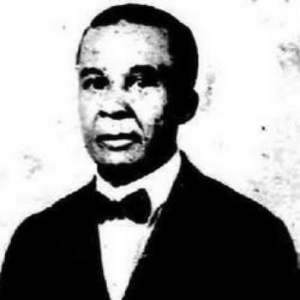
Jesse Shipp Sr.
*Jesse Shipp was born on this date in 1864. He was a Black actor, playwright, and theatrical director.
Born in 1864 in Cincinnati, Jesse Allison Shipp, Sr’s father, Thomas Shipp, was born a slave in South Carolina. His mother, Ellen Shipp, was of bi-racial heritage and was born around 1830 in the slave state of Kentucky. Sometime before the American Civil War, both had managed to leave the Southern United States to live in freedom in Ohio. Young Shipp attended public school in Cincinnati, graduating from high school at 16.
Upon graduation, he immediately entered the workforce, working as a retail clerk and driving a laundry wagon. In his free time, Shipp got together with three of his peers and formed a musical quartet, which sang evenings in the German section of Cincinnati. Shipp briefly joined a minstrel show based in Indianapolis, Indiana. In 1887, he took his quartet on the road, and they remained together for the next seven years, achieving success playing in conjunction with various traveling minstrel companies. Following the disbanding of his quartet in 1894, Shipp became an actor in the traveling black theater of the day, including roles in such popular performances as Uncle Tom's Cabin from 1894 to 1895, John William Isham's Oriental America in 1896 and 1897, and A Trip to Coon-Town from 1897 to 1899.
In 1900, Shipp was hired by the vaudeville team of George Walker and Bert Williams as a stage manager, writer, and performer for their troupe's productions. He wrote a series of plays for Williams and Walker in subsequent years, including books from which the seminal plays In Dahomey and Abyssinia, works noted for better plot development and character development than had been typical of Black theatre in the era. Around 1908, he went to work for Robert T. Motts and his Pekin Stock Company of Chicago. Shipp was hired as the resident playwright for the non-touring company. He authored several critically acclaimed plays during this interval. Still, his employer's demands for a constant stream of fresh fare forced Shipp to use traditional vaudeville forms increasingly.
By 1910, the Pekin Stock Company was in decline, wracked by competition from other theatres in Chicago, which had begun to supplement their dramatic performances with the showing of movies. Shipp took over the operation, renaming it the Jesse Shipp Stock Company. The company staged Many plays in the Pekin Theatre, including several written by Shipp. However, the Jesse Shipp Stock Company was disbanded in 1911. In 1913, Shipp produced and directed a Gilbert and Sullivan's Mikado performance for the Howard Theatre in Washington, D.C.
In 1921, Shipp established a second key African American dramatic club in New York City's Harlem, the Dressing Room Club. Located at the Harlem Community House on 7th Avenue, the Dressing Room Club declared as its official goals impressing the world with "the dignity and economic value of the Negro element of the profession" and preservation of the history of the Negro in theatricals. Over 250 New York's Black theatre leaders were members of this organization headed by Shipp, including writers, performers, composers, and musicians.
He was intimately involved with the Harlem Productions Company in 1925 and 1926, a group first organized to produce the musical farce Lucky Sambo. Debuting June 6, 1925, nine performances were staged on Broadway at the Colonial Theatre, with Shipp as stage manager. Jesse A. Shipp, Sr. died in June 1934. He is best remembered as a pioneer Black writer of musical theater in the United States and as the book's author upon which the landmark play In Dahomey was based. Shipp played an influential role in expanding Black theater beyond its minstrel show origins and is recalled as perhaps the first African American director of a Broadway performance. His son, Jesse A. Shipp, Jr., followed his father's footsteps into show business as the founder of the Shipp Association, a dramatic booking agency based in Harlem, New York.